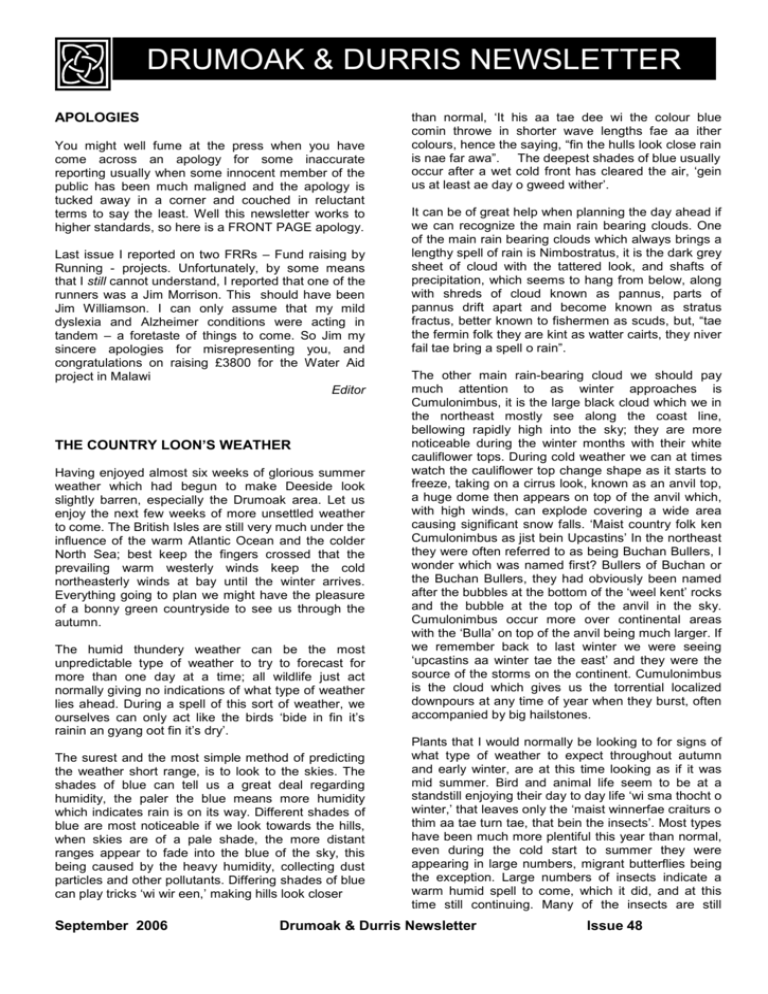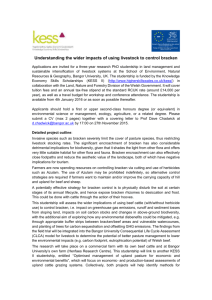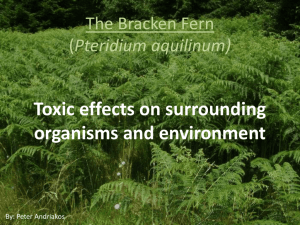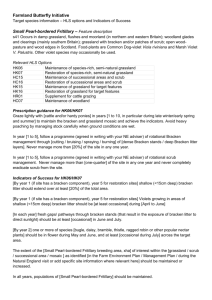Home building is all the rage in sunny Drumoak these days, as
advertisement

DRUMOAK & DURRIS NEWSLETTER APOLOGIES You might well fume at the press when you have come across an apology for some inaccurate reporting usually when some innocent member of the public has been much maligned and the apology is tucked away in a corner and couched in reluctant terms to say the least. Well this newsletter works to higher standards, so here is a FRONT PAGE apology. Last issue I reported on two FRRs – Fund raising by Running - projects. Unfortunately, by some means that I still cannot understand, I reported that one of the runners was a Jim Morrison. This should have been Jim Williamson. I can only assume that my mild dyslexia and Alzheimer conditions were acting in tandem – a foretaste of things to come. So Jim my sincere apologies for misrepresenting you, and congratulations on raising £3800 for the Water Aid project in Malawi Editor THE COUNTRY LOON’S WEATHER Having enjoyed almost six weeks of glorious summer weather which had begun to make Deeside look slightly barren, especially the Drumoak area. Let us enjoy the next few weeks of more unsettled weather to come. The British Isles are still very much under the influence of the warm Atlantic Ocean and the colder North Sea; best keep the fingers crossed that the prevailing warm westerly winds keep the cold northeasterly winds at bay until the winter arrives. Everything going to plan we might have the pleasure of a bonny green countryside to see us through the autumn. The humid thundery weather can be the most unpredictable type of weather to try to forecast for more than one day at a time; all wildlife just act normally giving no indications of what type of weather lies ahead. During a spell of this sort of weather, we ourselves can only act like the birds ‘bide in fin it’s rainin an gyang oot fin it’s dry’. The surest and the most simple method of predicting the weather short range, is to look to the skies. The shades of blue can tell us a great deal regarding humidity, the paler the blue means more humidity which indicates rain is on its way. Different shades of blue are most noticeable if we look towards the hills, when skies are of a pale shade, the more distant ranges appear to fade into the blue of the sky, this being caused by the heavy humidity, collecting dust particles and other pollutants. Differing shades of blue can play tricks ‘wi wir een,’ making hills look closer September 2006 than normal, ‘It his aa tae dee wi the colour blue comin throwe in shorter wave lengths fae aa ither colours, hence the saying, “fin the hulls look close rain is nae far awa”. The deepest shades of blue usually occur after a wet cold front has cleared the air, ‘gein us at least ae day o gweed wither’. It can be of great help when planning the day ahead if we can recognize the main rain bearing clouds. One of the main rain bearing clouds which always brings a lengthy spell of rain is Nimbostratus, it is the dark grey sheet of cloud with the tattered look, and shafts of precipitation, which seems to hang from below, along with shreds of cloud known as pannus, parts of pannus drift apart and become known as stratus fractus, better known to fishermen as scuds, but, “tae the fermin folk they are kint as watter cairts, they niver fail tae bring a spell o rain”. The other main rain-bearing cloud we should pay much attention to as winter approaches is Cumulonimbus, it is the large black cloud which we in the northeast mostly see along the coast line, bellowing rapidly high into the sky; they are more noticeable during the winter months with their white cauliflower tops. During cold weather we can at times watch the cauliflower top change shape as it starts to freeze, taking on a cirrus look, known as an anvil top, a huge dome then appears on top of the anvil which, with high winds, can explode covering a wide area causing significant snow falls. ‘Maist country folk ken Cumulonimbus as jist bein Upcastins’ In the northeast they were often referred to as being Buchan Bullers, I wonder which was named first? Bullers of Buchan or the Buchan Bullers, they had obviously been named after the bubbles at the bottom of the ‘weel kent’ rocks and the bubble at the top of the anvil in the sky. Cumulonimbus occur more over continental areas with the ‘Bulla’ on top of the anvil being much larger. If we remember back to last winter we were seeing ‘upcastins aa winter tae the east’ and they were the source of the storms on the continent. Cumulonimbus is the cloud which gives us the torrential localized downpours at any time of year when they burst, often accompanied by big hailstones. Plants that I would normally be looking to for signs of what type of weather to expect throughout autumn and early winter, are at this time looking as if it was mid summer. Bird and animal life seem to be at a standstill enjoying their day to day life ‘wi sma thocht o winter,’ that leaves only the ‘maist winnerfae craiturs o thim aa tae turn tae, that bein the insects’. Most types have been much more plentiful this year than normal, even during the cold start to summer they were appearing in large numbers, migrant butterflies being the exception. Large numbers of insects indicate a warm humid spell to come, which it did, and at this time still continuing. Many of the insects are still Drumoak & Durris Newsletter Issue 48 multiplying in numbers. Could this be nature’s way of letting them increase so that there would be safety in numbers, giving at least some a chance of survival in a severe winter? Similar insect increases occurred over two to three year periods during the 1950s and 1970s both ending with severe winters. It will be interesting to see if the swallows migrate before or after the autumn high tides which, this year will occur earlier than most years - it will be between the full moon on the seventh of September and the last quarter. If they wait till the high tides are past ‘we micht get mair fine wither, anthier sax wiks widna gyang far wrang’. The Country Loon MEDICAL NOTES It has been an excellent summer for giving us the opportunity to get out and about and enjoy the good weather and we have all perhaps been more physically active as a result – particularly living in such an attractive part of the country with so many outdoor activities on tap. The school holidays have been well used this year for sports and outdoor exercise generally. With the evolving concern about levels of overweight and obesity in the UK it is most important to keep up good amounts of calorie-burning exercise, in addition of course to a balanced healthy diet. So if you’ve had an active summer, keep up the good work; if you’re thinking about taking up some exercise then walking is a good start. Our practice has just been through a major upgrade to the computer system, which was significantly disruptive for a while. However, thanks to major effort on the part of our dedicated staff and to the patience of our patients, it has been a success. It has also been a reminder to us how much we are reliant on electronic technology in this ‘information age’; we communicate with colleagues electronically, write our clinical records on computer (therefore legible!), receive lab results direct to our computers and scan hospital reports into the electronic patient record. The advantages are speed of communication and an improvement in the efficiency of administrative systems in the practice, however it does take some effort to reach a competent standard in computer use. Increasingly our GP registrars (trainee GP’s) are proficient in keyboard typing skills, which leaves me, the original two-finger typist, envious. Perhaps this should become an integral part of general education. Fortunately there are courses available to help us come up to speed with our computer skills. The internet too has become an immense resource for medical professionals and patients alike although sometimes it can be difficult to filter out the best quality information easily. This is where we human doctors still have an advantage over the electronic databases …. So I don’t think we are in danger of being replaced quite yet! Dr Douglas Harris June 2006 BRACKEN FOR BREAKFAST ANYONE? Those of you that walk in the Old Wood of Drum will no doubt have noticed the incredible growth of the bracken this year. With the help of eager volunteers we’ve been battling to control it beside the trail and in the large open areas where we are trying to encourage more wild flowers to grow. We suspect the bracken has benefited from the strange weather we’ve had so far this year with the mild winter certainly helping to encourage early growth. It is found all over the world except the Artic and Antarctic. Although bracken is an important and natural part of woodlands it is spreading rapidly in many countries. One reason for this may be climate change. But there are many other reasons. In times long gone the Old Wood would have had wild boar grubbing up the young bracken which would have kept it in check. We also believe there would have been cattle grazing in the woodland which would trample the young shoots before they could grow into the head high bracken we see today. Bracken starts of as a really quite cute little curled up frond (a complicated leaf) covered in downy hair and tiny brown scales. It’s often likened to a shepherd’s crook or a fiddlehead. However as it unfurls and grows it tends to dominate the woods and shade out other plants. It can reach over 4 metres in the right climate.The fronds grow from an underground rhizome, the equivalent of a root. When split in half the rhizome has a pattern reminiscent of an eagles wing, which may account for its Latin name, aquila, which means eagle. Sometimes the pattern looks like letters of the alphabet. In the past it was believed that these showed the initials of a future spouse! It is considered a delicacy in some countries, but only when it is very young. However I would not recommend tucking into a nice bowl of bracken for breakfast as it is highly toxic. It contains a poison which causes a lowering of bone marrow activity which leads to anaemia. It has also been linked to throat and stomach cancer in animals, but as far as I know, the jury’s still out on whether it causes these cancers in humans. Unwary cattle and horses have suffered over the centuries from feasting on bracken. Bracken does provide shelter for many creatures though. Butterflies and moths shelter from the wind in bracken and roe deer hide their young in it. Other beasties which reap the benefit of plentiful bracken are not such popular ones – ticks! There have been huge numbers of ticks around this year; this has caused many estates to report very low numbers of ground nesting birds due to them being covered in ticks and losing so much blood that they have died. The plant has been used for many practical purposes such as compost, mulch, tinder, packaging and bedding. In Scotland back in the 18th Century it was Drumoak & Durris Newsletter Issue 47 2 burned to obtain the potash needed for soap and glass manufacturing. With the demise of these practices harvesting bracken stopped in most of Europe; yet another reason for its rapid spread. So if you fancy getting some exercise and helping control the bracken in the Old Wood next year drop me an email fmilne@nts.org.uk or give me a call and I’ll put you on our list of willing volunteers! Fiona Milne Senior Ranger, NTS Crathes NATIONAL TRUST WEEKEND ACTIVITIES Crathes and Drum Castles provide a number of weekend events in the autumn. If you are looking for something for the children to drag them from their computer games or just want to do something different in the fresh air, to You might check them out they are listed in the diary sheet at the end of this Newsletter. – or phone 01330 844 810 We have games and crafts, as well as singing and learning more about people from the Bible. On the 1 st, 3rd and 5th Sundays of each month we meet at Durris at 10am and then on the 2nd and 4th Sundays we meet at Drumoak at 10am. For more information please ring Roz Scott on 01330 844557. YSUNDAY Around 27 teenagers pack into the manse in Durris every second Sunday evening for a varied programme of games, activities, speakers, video, drama, food, discussion of issues etc. YSunday is open to all in 1st6th year school. One highlight of the year is the Activities/Ski-ing Weekend at Glenshee in February/ March. Other activities last year included lively involvement in worship, ten-pin bowling, barbecues, learning about and raising & donating funds for practical projects in the developing world. New members are always welcome. YSunday restarts on Sunday 3 September in the manse, 7.00 - 8.10pm. The Contact Person is Tom Feist-Wilson (Junior Leader) Tel. 01330 811 480. SATURDAY RUGBY FOR KIDS KIDZ AT THE KIRK – Some other activities for children Did you know that the Church of Drumoak-Durris has heaps happening for children and young people of all ages? Read on…. SPLAT BANCHORY COMMUNITY LEARNING & DEVELOPMENT Open Weekend. If you have children between 0 months and 5 years old why not bring them along to our preschool music group? We meet every Wednesday during term-time from 1.15 to 2.30 in Drumoak Church Hall (opposite the school). We sing, play instruments, dance, march and shout together and have lots of fun learning about the world of music. Percussion instruments, rhythm sticks or whistles, puppets, masks or drums all add to the variety. We like to sing songs from around the world, weather songs, train songs, animal songs, food songs, lively Christian songs, old favourites and brand new wacky ones! We finish with snacks and drinks and a chance for the adults to catch up while the children play. The charge is just 50p per family, per session. It’s a very informal group and great fun, do drop in, we’d love to see you. If you would like more information please ring Sarah Marshall on 01330 811767 or Mary Robertson on 01330 811593. SUNDAY CLUB Can’t get out of bed on a Sunday? Sunday Club is definitely worth waking up for!! On a Sunday the church has various activities running during the Sunday Service. For those under 3 there is a crèche. For nursery and primary school age children there is a special Sunday club. We start off with the adults in church, and then go out for our own fun time together. June 2006 Saturday morning training has just started at Tillybrake playing fields Banchory at 10.30 am. Micros (P1-3) Minis (P4-7) and youths (S1/2, U15, and U16) Banchory Community Learning and Development is having an Open Weekend on Saturday 9th and Sunday 10th September to promote their Services. The Saturday will consist of the class enrolments for the Adult Learning programme between 10am and 12noon in the Community Facility at the new Hill of Banchory Primary School For classes that start before this date please turn up to the class and enrol on the day. Stick around after your enrolments for lots of fun and games from 12noon to 4pm. During this time there will be a number of opportunities to find out about Community Centre facilities and Services as well as many other community and voluntary organisations in the area. There will also be some hands on activities including tours of the building, story sessions, messy play, careers advice, mini health checks and much more. Also on Saturday from 12noon to 4pm there will be a Community Fun Day in the Hill of Banchory Primary School playground, planned and organised by young people from the Hill of Banchory area. A crèche will be available for some of the day, please call 01330 826253 for more information on this or any of the above. Drumoak & Durris Newsletter Issue 47 3 On Sunday there will be a Youth Fun Day in the Community Centre at the Academy from 12noon to 4pm, where there will be the usual fun and games including, rock wall, bouncy castle, live music, youth café, drunk driving course and many more demonstrations and fun. Established youth groups will be there to promote their achievements as well as recruit new members. All young folk from 11 to 18 years old are welcome, as are adults who would like to find out more about what services are available for young people in the area, or would like an opportunity to volunteer. There are no entrance fees for either day and all refreshments are free. Looking forward to seeing you all there and we will be glad to deal with any enquiries on 01330 826253. I started a new self-help group. The Health and Leisure group would offer gym membership and organise outings to do healthy leisurely things. It does what it says on the tin. I applied to various places for money. Grampian Police, NHS Grampian, the City Council. I got some donations from friendly companies like Qserv. Cheers Mike. Once we had £3000 we were up and running. Literally. I now go to the gym five times a week with folks who otherwise might be drinking White Lightning but who instead now like to wind down after a days work. At this rate, I'll be fit to run a marathon fairly soon. We have had golf days, curling evenings, camping weekends, a trip to the Scottish Parliament (big thanks to the very lovely Dr Nanette Milne MSP) I have lost 4 inches from my waist, the kilt fits fine, but the strange thing is I have lost very little weight. BANCHORY COMMUNITY DEVELOPMENT GROUP Banchory Community Development Group (CDG) is your local forum to discuss local issues that affect you in your work, home or play life and is made up of local people interested in their communities. Local people serving on CDGs can ensure that local leisure and learning opportunities are what their communities need. Members of the groups have real say in what goes on and have control over the local Community Development Funds. Currently, CDG has a 9 community volunteers with 6 local Councillor and staff members, but more volunteers are sought. If you, or anyone you know, have an interest in positive Community Development. Please contact Lindsay Melrose, Community Learning Worker, Banchory Community Learning Centre tel 01330 825966 FUND RAISING EVENTS THE WORLD’S BIGGEST COFFEE MORNING The Macmillan Cancer Support have organised a nation wide coffee morning to generate funds to Help make a difference to people living with cancer. So on Friday 29th September why not have your coffee break in Drumoak Church Hall and support this worthwhile cause. Coffee is served 10.30 to 12.30. Jill Gow (01330 811 495) CONFESSIONS OF A WOULD BE MARATHON RUNNER -- SANDY WALLACE TELLS ALL! The year started with various problems that needed addressed. Firstly, I was 42 years and 17 stone. That’s 3 overweight. I needed to lose 2 inches to get into my kilt for my nephews wedding. Secondly, at my work (the best little alcohol rehab charity in Scotland), I had come to realise that many of my clients had no hobbies other than drinking. So even if they really wanted to change, they struggled to see what they could change into. I'll tell you about the other problems in a minute. June 2006 The other problem was that being a full time alcohol rehab worker, a full time councillor and a dad of two primary school kids, I was struggling to do justice to it all. And in any case, the Council moves so slowly, that sometimes I despaired of getting things done. As my party's Education spokesman, I wanted to help Carronhill Special needs schooI in Stonehaven but I was making slow progress. I was on the management committee of two great charities, Linn Moor in Peterculter, a Voluntary Service Aberdeen project caring for kids with some very profound learning difficulties and Beannachar on the South Deeside Road, a Rudolph Steiner project providing homes and supported employment for young adults with learning difficulties. But both management committees did their work on Thursdays, when Aberdeenshire Council hold their policy committees. I was rarely free to do anything for them. And if by any chance I was "free", my employer kinda expected me to show up at work. Understandable I suppose. With regrets, I decided to resign from the two charities. Then I saw a poster. Run the New York marathon in November for charity. A charity called Kids will arrange my flights, hotel and race entry if I raise £2000 for them.and, if I raise more, they are happy that I give it to local charities. I thought, " I could raise £8000". Two grand each for Kids, Carronhill, Linn Moor and Beannachar. Now it’s sunk in. The training is going well. Honest, I will manage to run 26 miles. But £8000? Is that possible? I have contacts, I get opportunities to reach out to people. If everyone I meet gave me a quid, I would raise £2000. But realistically they won't, so if every fifth person I meet gives me £5 that amounts to £2000. If every company I deal with gave me a tenner, that would be £2000. Same problem, but maybe every tenth company will give £100 and that is £2000. Then maybe I can get other people who meet other people to take sponsorship forms and raise money for me. Wife, kids, colleagues, friends, family, other councillors, council officers I know well. The parents Drumoak & Durris Newsletter Issue 47 4 and staff at the places I am raising money for. 100 people raising £20 each. That would be £2000. £2000 left. I write articles for community newsletters, of which this is one. They are read by people I never get the chance to meet. If every reader gave gave 20p, that would be £2000. They won't but if every tenth reader gave £2.00? One shiny brass coin? Are you a one on ten? I really hope so. I believe I can do this. 26 miles by foot, six months of training, 4000 miles each way, 3 stones in weight, 4 inches off my waistline, 4 charities, £8000 for kids with special needs, one in ten readers of this article, £2, one shiny brass coin. Lots of numbers, but surely, zero problem. Please help me. You can send me a cheque to Spyhill Cottage, Durris, AB31 6DH, payable to Sandy Wallace New York Marathon Account. You can call me on 0780-1900-841 and I will tell you who I know near you that will collect your donation. Thanks, when the pain sets in, your support will keep me going. Sandy DRUMOAK DURRIS & CRATHES BOWLING CLUB A few reminders:Sat. 30th Sept. 2.00pm Tues. 3rd Oct. Sat. 28th Oct. 7.30pm Green Closure and prizes. Indoor Bowls begin Concert in the Pavillion BIG BROTHER KNOWS WHERE YOU LIVE !! John Hopkins describes some of the sinister aspects of combining the ubiquitous post code with data bases When the GPO – as it then was - introduced postcodes throughout the UK in the Sixties and Seventies, many of us thought that it was just a way of helping Postman Pat to deal with bad handwriting on letters. In fact, Pat (not to mention Jess, his cat) needed all the help he could get, what with deliveries being twice daily - even on Sundays - in those far-off golden days. Postcodes are alpha-numeric (e.g. AB31 6TY). When they were introduced, people complained that they were much more difficult to remember than all-number codes, such as US zip codes. Of course, these were exactly the same people who had complained a few years earlier when phone numbers went from being alpha-numeric to all-number. Everyone could remember that the number for Scotland Yard was Whitehall 1212. Has anyone any idea what the number is now? Even if it started out as just a postcode, it wasn’t long before companies realised that it was a great basis for collecting and analysing data. June 2006 Take the example of AB31 6TY. AB31 is one of the sorting offices for Aberdeen. The 6 indicates a sector for this sorting office. The letters TY indicate a unit within a sector. Each unit contains an average of 15 properties. For many purposes, the unit is an ideal size for data analysis. For others, the sector (AB31 6, in this example) is better. If you are a home insurance company and your existing customers in TW9 5 claim for burglary three times more often than the national average, you’ll think twice about taking on another customer in TW9 5. More controversially, you may charge them more for their insurance – or even refuse to sell them a policy. If you are a police force, you may send more foot patrols to those postcode areas where most crime is reported (or you may just concentrate on nicking drivers for speeding, because it is so much easier). Did you think supermarket “loyalty” cards were about loyalty? Think again. In exchange for a bit of a discount and a few BOGOF coupons, you give the supermarket your address and postcode. Every purchase made using your card is then recorded and analysed by their computers to give a detailed picture of how much you spend and what on. This means they can target offers at very selective groups, perhaps sending leaflets by post to all households in a couple of dozen specific postcode units. If you are a loan company or building society, you may decide to simply avoid doing business altogether in certain postcode sectors or units. Of course this practice (called “red-lining”) has been discontinued in the interests of social justice. Similarly, the moon is made of green cheese. Even if the jury is still out on whether Santa Claus actually exists, it is nonetheless true that he has been given a postcode by the Royal Mail. The full postal address (so you can send your Christmas letters in good time) is:Santa Reindeerland SAN TA1 So, there is a vast number of private company databases brimming with data about us and our immediate neighbours. However, it is only when the data in these is joined together that the power of the system becomes apparent. There are “data warehouse” companies now, who exist to build up (and sell) such data profiles. They start by loading various publicly-available datasets, such as the Post Office’s National Postal Address File, the full Electoral Register, the Companies House file of Company Director’s names and addresses plus various shareholder registers. Because this information is in the public domain, Data Protection regulations can be ignored. Then comes the clever part. The Post Office’s National Postal Address File contains a complete Drumoak & Durris Newsletter Issue 47 5 register of all valid postal addresses in Great Britain together with their current postcodes. The computers read the addresses and start to categorise the property type. If the address contains the word “Flat”, it is likely to be a smaller property and in a town. If it contains the word “Farm”, it is likely to be in the countryside. If it doesn’t have a street number, it is likely to be in the countryside. If it’s called “Hall”, it is likely to be bigger than somewhere called “Cottage”. On its own, this categorisation is not watertight, but when combined with other information, it becomes more and more accurate. The Electoral Register contains details of all citizens allowed to vote in elections in the UK. The names and number of adults in each household make it possible to identify the likely composition of that household (e.g. married couples with shared surnames, apparent “bidie-ins” and complex households where there are three or more electors present with two or more family names). As with the address analysis, the apparent form of the household is not necessarily a wholly reliable indicator on its own. But it all adds up, and checking all the old versions of the Electoral Register makes it possible to identify the number of years that any particular individual has been present at a given address. Everybody knows that certain forenames have been fashionable at different times - John and Susan in the Fifties, Wayne and Waynetta in the Eighties, Brooklyn and Romeo today. The data warehousers use this information to establish the age distribution of people with each of the more common forenames. To improve accuracy, they use not just the forename of the individual but also the forename of any partner with the same surname at the same address, plus the information on duration of residence at that address. And do you think it would be possible to guess at someone’s religion and ethnicity from their surname? If you were a loan company offering conventional loans, you might conclude that it makes no sense to send advertising to Muslims (for most of whom paying or charging interest is unacceptable). And would you market England tee-shirts to someone whose name starts “Mac” or “Mc”? If you are thinking that this sort of reckoning is not a proper job for a person, you are absolutely right. But it’s just the job for a computer. So what next? Add in the Census data (available publicly down to postcode unit level). Conduct “lifestyle surveys”, where you get people to fill in long and detailed postal questionnaires about their preferences in exchange for money-off vouchers (or entry in a “Free Draw”) and add all that in. Also, have you noticed how many other ways companies try to get hold of your name/address/postcode details? Free samples of shampoo – just fill in the form. A copy of our guide to investment – just submit a web request. June 2006 Every little bit of data is a jigsaw piece and – referenced by your postcode – adds up to a detailed picture of you and your neighbours. If you are like me, you will probably be a bit worried about some of the ways in which this sort of data can be abused by private companies. However, this is as nothing compared with what the Government will be able to do, once it combines all the databases to which it has access. They haven’t got very far with this yet, but just give them another eighteen years. It’ll be 2024, but it’ll seem just like 1984. You may wonder why the Government doesn’t already have this power. My theory is that there is a secret libertarian resistance movement in the heart of the Civil Service which is nobly sabotaging every such development. You may, of course, prefer to believe that the appalling record of failures and cost overruns in virtually every Government computerisation project is simply due to gross incompetence. And these people want to inflict an ID card on us? John Hopkins CRATHES DRUMOAK & DURRIS COMMUNITY COUNCIL CRATHES PLANNING: The new housing mooted for Crathes in the Aberdeenshire Local Plan has reached the stage of draft Development Brief (pre-submission of a planning application). The Development Brief, about to go before the Marr Area Committee for approval was discussed at a recent meeting held at the request of the Community Council. Community Councilors David Morrish and Tony Butcher met with Aberdeenshire planners. The landowner, Dunecht Estates were represented at the meeting by Stuart Young and Ryden Property Consultants. The ground in question lies in front of the old Crathes Garage where is proposed to build a first phase of 45 houses. The location has no sewerage, no gas, no shops and a school 2 miles away with no foot or cycle path connecting it to the village. On these and other points, the proposal has received local objections, supported by the CDDCC who are at a loss as to why such a development is considered, but they will remain connected to the planning process in the hope that sense will prevail. At the meeting CDCC asked, why, in these environmentally sensitive times, would we be considering a housing development with individual oil or gas tanks? They involve the unnecessary use of road tankers and pose a risk of leakage to ground water. Why are we continuing to load up already dangerous commuter routes such as the South Deeside Road? Why are we building in such a prominent location? If you are interested in getting involved with this issue please contact you community councillor.www.durris.net/html/community_councillors. html David Morrish Chairman, CDDCC Drumoak & Durris Newsletter Issue 47 6 taking place as to what improvements can be made to the existing plant.” DRUMOAK SEWAGE SAGA Many people are asking about what is happening with the Drumoak Sewage plant, so the Newsletter has made a few enquiries. One of the Scottish Executive Reporter’s condition finding in favour of the houses was that “No development shall commence until a) the waste water treatment plant at Drumoak has been upgraded to a standard which can accept the additional foul water from the development, and b) works have been undertaken to create a safe crossing point for pedestrians over the A93. Reasons: in the interests of public health and the safety of pedestrians” In response to our enquiry, a senior representative of Stewart Milne Homes told the Newsletter that they are having difficulties with Scottish Water who had changed the design concept after SMH had designed the plant, and in consequence were having to redesign the plant……… Its good to know that so many people are looking after our welfare each time we flush the loo! Editor According to Planning Services the extension was approved last year but some minor amendments to the scheme required further authorisation which was only granted some two weeks ago. This would explain why the work, that started some months ago when W.M. Donald set up their site office and removed some of the screening trees, has stopped. The next meeting of the liaison group will be on Wednesday 20th September. If anyone has any complaints or observations can they please call Donald Keith on 01330 811 763 by the 19th Sept. Enquiries to Scottish Water who have the responsibility for treated water disposal resulted in the following statement: “Scottish Water is committed to delivering an upgraded waste water treatment works for the Drumoak area. As well as providing an improved level of treatment it will also cope with the ongoing expansion of the local housing stock. This work will be carried out by Stewart Milne. Scottish Water is currently going through the design and technical approval process and is working closely with SEPA to obtain a new discharge consent for the upgraded works and select a suitable outfall site on the River Dee.In advance of the proposed work at the site, some trees have been removed to allow the work to go ahead.Some houses have already been connected to the existing waste water system in recent times. The treatment works are operating very close to capacity and are still within their current consent from SEPA. Stewart Milne will be carrying out some interim improvements to the plant so it will remain within the consent until the full upgrade has been completed. Scottish Water hopes to complete this waste water improvement as soon as possible.” Meanwhile, SEPA have told the Newsletter : "Drumoak Wastewater Treatment Plant continues to be monitored and regulated by the Scottish Environment Protection Agency (SEPA). There have been no consent failures this year, with the most recent sample taken on 17 August 2006. The developer has reached an agreement with Scottish Water that they will contribute to the modernising of the sewage works, however the discharge currently continues to operate within the existing consent conditions, whilst an investigation is June 2006 PARK QUARRY LIAISON MEETING KEEPING OUR BEAUTIFUL ENVIRONMENT BEAUTIFUL Recently, I received an this e-mail from Claire Gillespie who raised a very interesting point that is worth sharing with the community. It said: “I am emailing you because I can't find an email address for those responsible for the Deeside Way on the website. I read in the recent CDDCC meeting minutes that the Deeside Way is being officially opened in June. I am wondering if the Deeside Way people would be interested in getting local people to volunteer to look after (adopt) a section of the route to keep any eye on. I live at the Park end of Drumoak and regularly collect litter and cover dogs dirt on the section between Park Shop and Park Estate walled garden. I also collect litter from the road between Park Shop and Coupers road (via Tersets farm). I read in a past newsletter that a local man collected litter between Park shop and the main village so I think it may be possible to get other volunteers. Anyway this is just a suggestion - I will keep on doing what I do even if my idea goes no further.I look forward to hearing form you or whoever is responsible for the path”. It’s a very interesting question. Whilst we might expect ”The Cooncil” to carry out major maintenance on our footpaths, we can hardly expect them to pick up all the rubbish deposited by their users. Yet if no one does there will be a litter trail from Aberdeen to Banchory in no time, and the task would rapidly be beyond us. But if we do it bite by bite – like eating an elephant, we would soon keep our environment beautiful. If Claire’s message strikes a chord with you, call 01330 811 763, to register your interest. Drumoak & Durris Newsletter Issue 47 7











